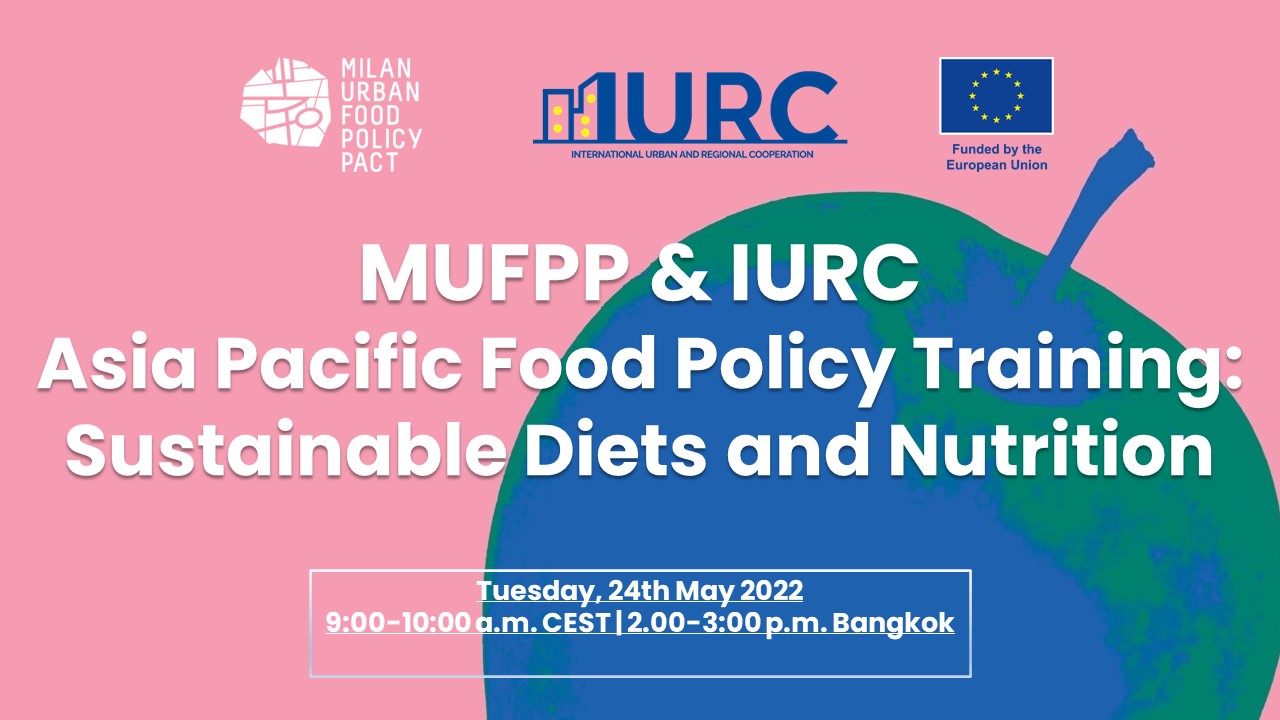After the success of the previous food policy training on governance in April, the second MUFPP and IURC webinar was held on 24 May 2022. The webinar presented how cities can promote sustainable diets, better consumption, and nutrition patterns in their communities through a variety of public services such as school canteens, child nutrition, and food assistance programmes.
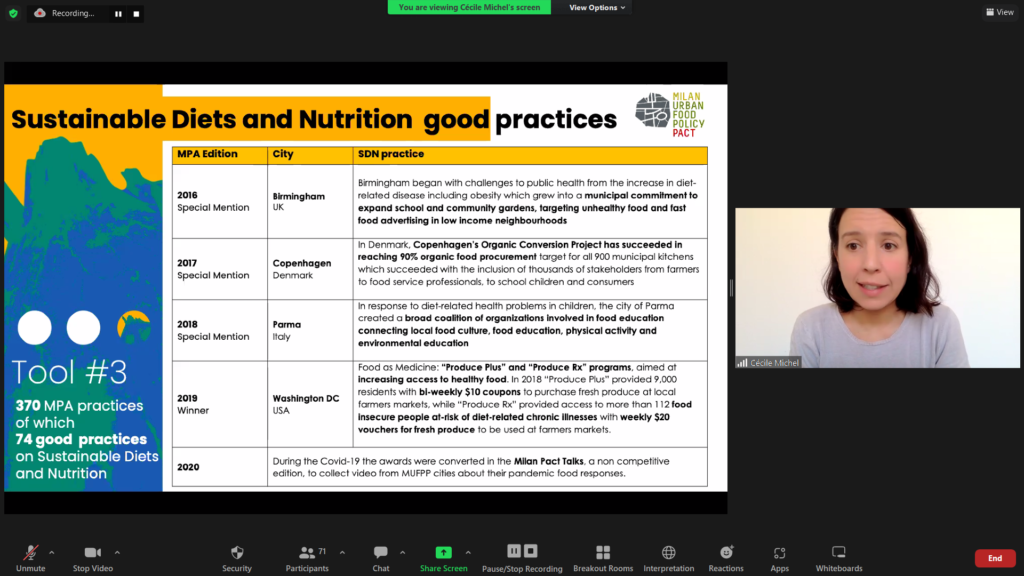
Cécile Michel, an officer at the Milan Urban Food Policy Pact Secretariat, City of Milan, introduced the promotion of sustainable diets in the MUFPP. Under the Sustainable Diets and Nutrition category, seven recommended actions were defined, along with 12 indicators. The recommended actions are 1) promote sustainable diets through education, health promotion, and communication programmes, 2) address non-communicable diseases associated with poor diets, 3) develop sustainable dietary guidelines to inform consumers, 4) adapt standards and regulations to make sustainable diets and safe drinking water accessible in public sector facilities, 5) explore regulatory and voluntary instruments to promote sustainable diets involving private and public companies, 6) encourage joint action by health and food sectors, and 7) invest in and commit to achieving universal access to safe drinking water. To facilitate the use of indicators, a set of methodological guidelines has been developed, containing information on the types of data required, the data collection method, how the indicator is constructed, the resources needed, etc. The guidelines for twelve diets and nutrition Indicators are available here. Each guideline also highlights the connections with the SDGs and targets. A list of sustainable diets and good nutrition practices was also presented, collected through the Milan Pact Awards.
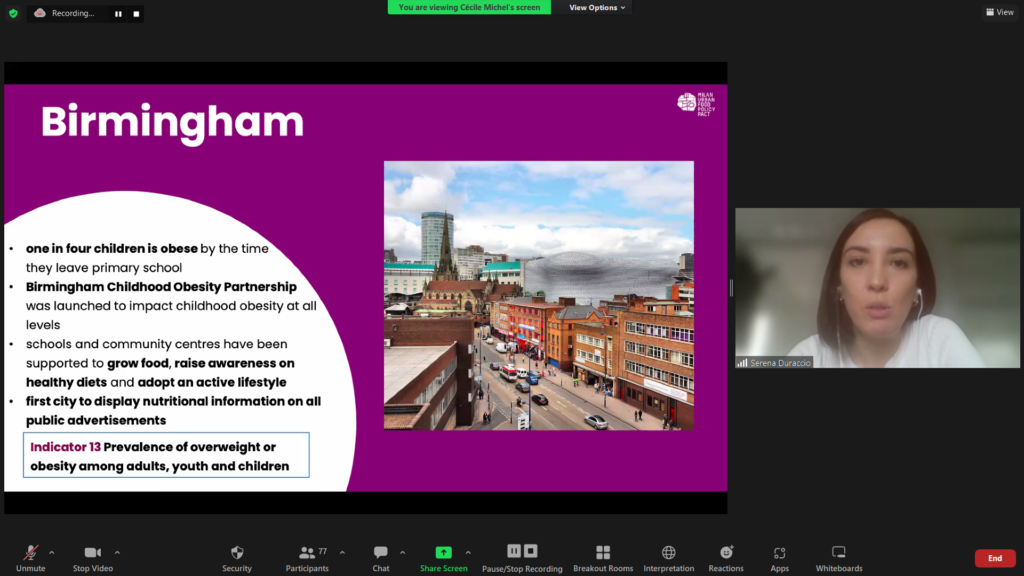
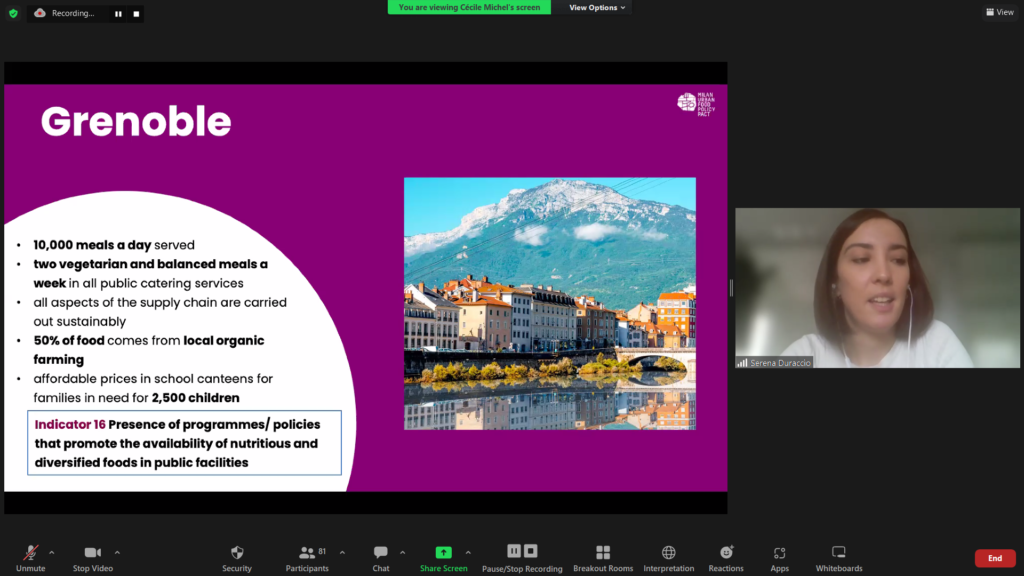
Serena Duraccio, another officer at the MUFPP Secretariat, provided examples of sustainable diets and nutrition from two European cities: Birmingham and Grenoble. In Birmingham, one in four children is obese by the time they leave primary school. The city established Birmingham Childhood Obesity Partnership in order to impact childhood obesity at all levels, including through policy change partnerships and communication of a sustainable food programme. Schools and community centres have been supported to grow food, raise awareness of healthy diets, and adopt an active lifestyle. All the efforts have successfully made Birmingham the first city in the UK to display nutritional information in all public advertisements. This case demonstrates Indicator 16, where there exist programmes/policies to promote the availability of nutritious and diversified foods in public facilities.
The second example is Grenoble, which provides 10,000 meals a day through public catering services, including school canteens and nurseries. The city serves two vegetarian and balanced meals a week in all public catering services. They are also trying to achieve make all the aspects of the supply chain sustainable and to have 50% of food from the local organic farm. They are also paying attention to food distribution by removing plastic packaging. Excess food is donated to vulnerable people. They also ensure the affordable prices in school canteens for families in need for 2,500 children. Same with Birmingham, the Grenoble has achieved Indicator 16.
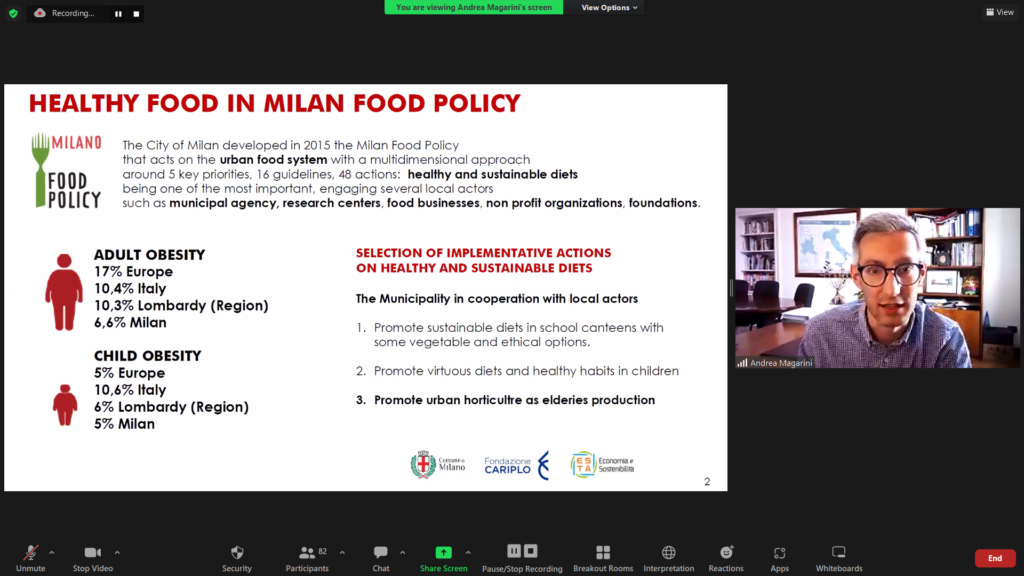
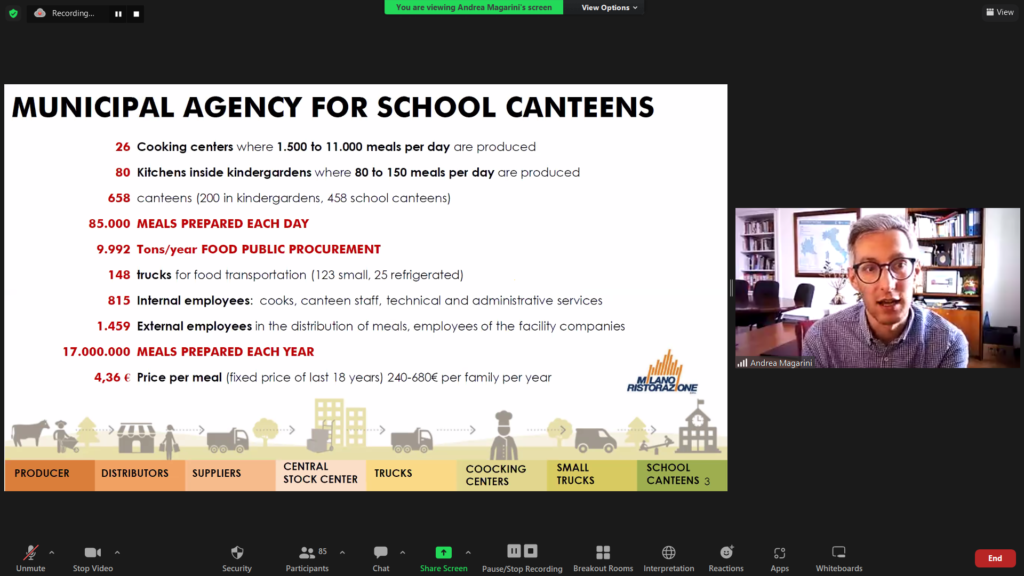
Andrea Magarini, representing Milan City, shared his city’s experience with healthy food. The process started with the assessment of the obesity rate for adults and children. In 2017, about 5.4% of Milan’s population suffered from diabetes. Without any action, the rate is projected to increase to 5.8% in 2045. The projection model shows that with an intervention aimed at reducing the obesity rate by 2045, the rate will drop to 5.1%. This has encouraged Milan to work with all partners. Through the municipal agency for school canteens, about 86,000 meals are prepared each day that are produced from 24 cooking centres for school canteens. All those facilities are well spread around the cities. The city has organized a parental control commission in each canteen to allow parents to become inspectors. A food safety survey is filled by parents and shared with the Food Policy Department and School Canteens Municipal Agency. Further, Mr. Magarini highlighted the healthy diet programme for kids, aiming to eliminate added salt and red meat from the menus. A programme called “Morning break with fruit” is promoted, in which children receive fruit in their classrooms as a morning snack instead of at the end of lunch. Another best practice is the introduction of new short supply chains for public procurement. The city also pays attention to the environmental impact of healthy diets, where they have committed to reducing 25% of food-related greenhouse gas (GHG) emissions by 2030. Through the introduction of the new recipe, the GHG emission decreased by 20% between 2015 and 2019.
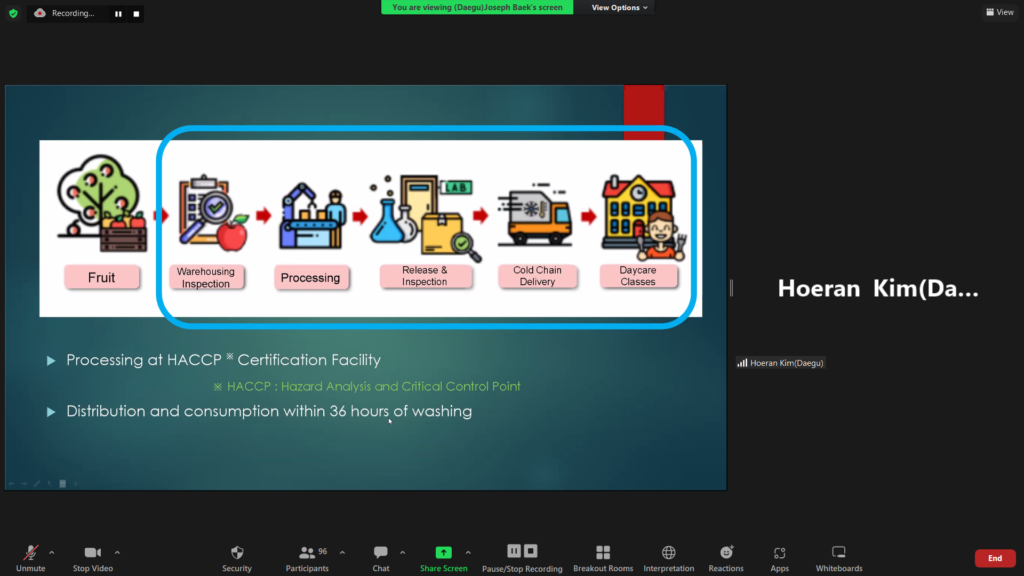
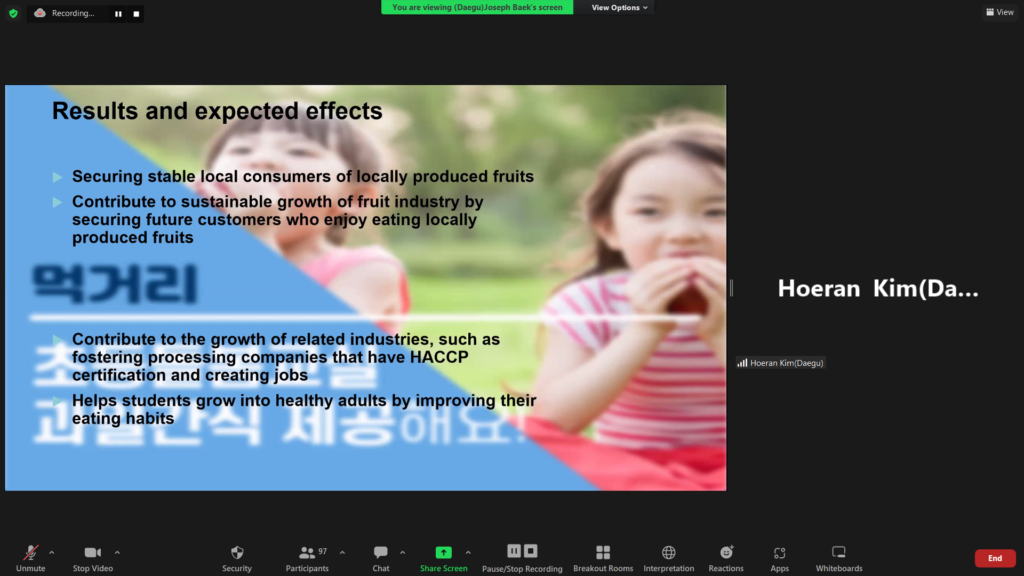
Joseph Baek, Deputy Director of Management Team of Agricultural Wholesale Market, Daegu Metropolitan City, presented the fruit snack programme for primary schools. The programme aims to reduce the obesity rate among children and boost the consumption of major domestic fruits. The selection process of a fruit processing company is done through a public contest, which involves both national and local governments. Some criteria have been established for the selection. Among them are pesticide-free agricultural products, which require a number of more kinds of fruits and local production. Further, Mr. Baek shared the overall process of the fruit distribution process from warehouse inspection to day-care classes. The fruit snack programme has demonstrated positive changes in a few ways: 1) improving children’s eating habits, 2) increased recognition from parents and teachers for the effect of improving children’s eating habits, and 3) positive response from parents about the need to expand the business.


After the presentation from the speakers, some participants share their cities’ experiences in promoting sustainable diets and nutrition. Andoh Toshijuki shared the Tokyo Metropolitan Government’s initiatives to cut food loss while Siriwat Pokrajen, Country Coordinator for Thailand of IURC Asia & Australasia, briefly introduced the Bangkok Metropolitan Administration’s online platform called “Thai School Lunch for BMA”, which is used for managing school meals, focusing on nutrition and having features on ingredient procurement management and budgeting.

Before closing the webinar, Filippo Gavazzeni of the MUFPP Secretariat invited cities to join the 6th edition of the Milan Pact Awards, which opens for all signatory cities that want to showcase their best practices. He explained the application process. The application deadline is 15 June 2022. The MUFPP Secretariat announced that the third webinar on social & economic equity would be organized in July 2022.
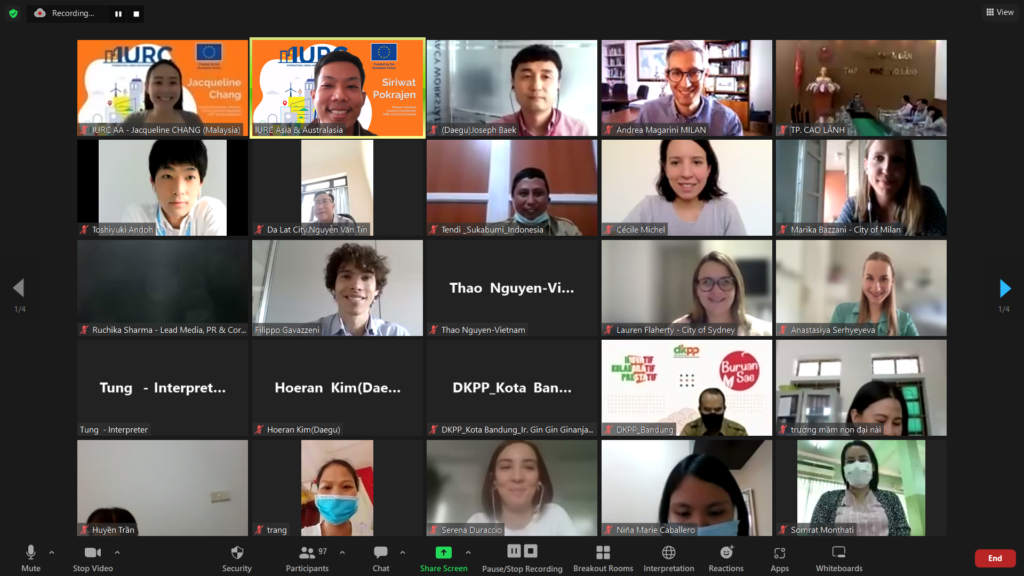
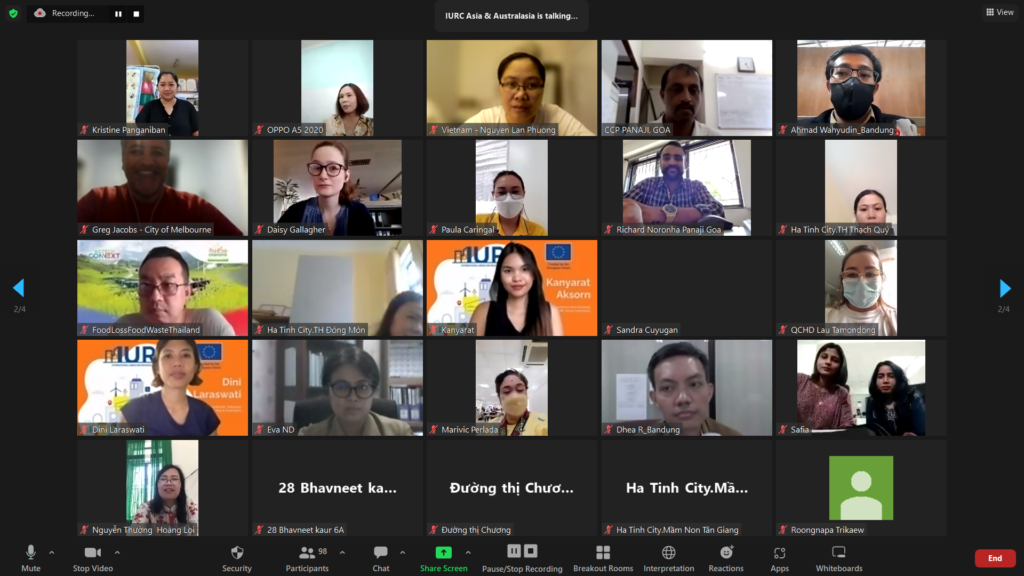
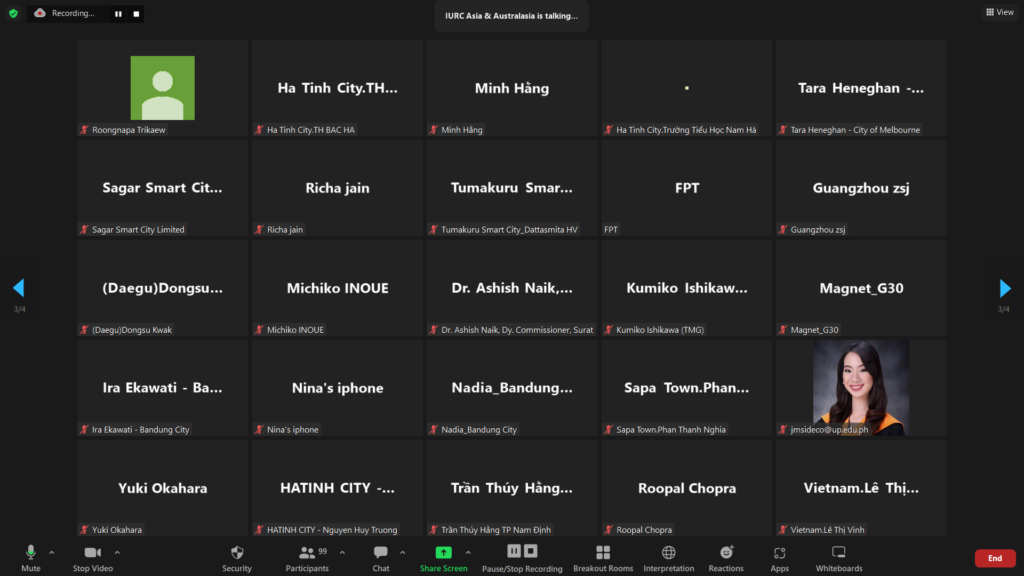
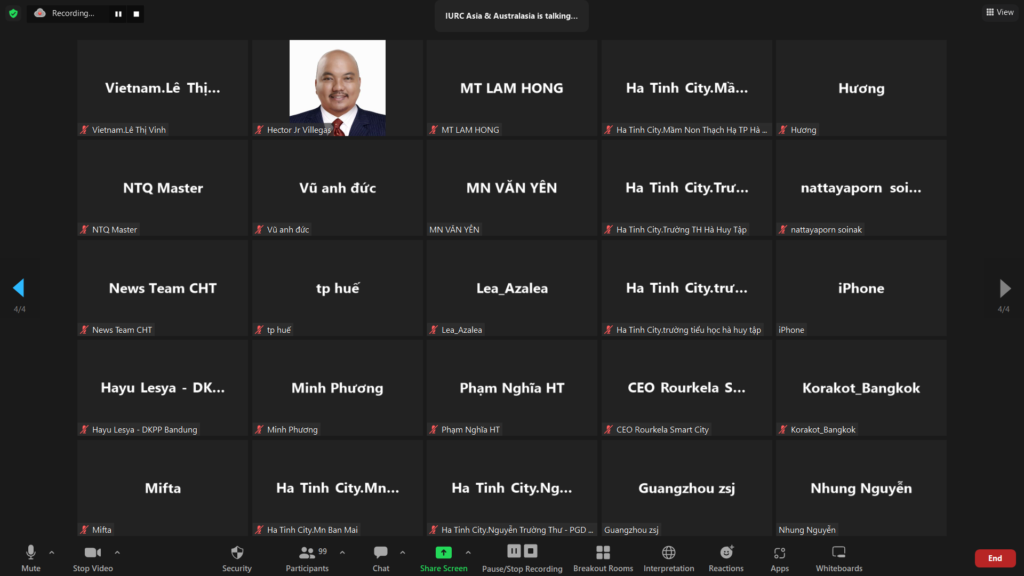
Presentations
- Asia Pacific Food Policy Training: Sustainable Diets and Nutrition
- School Canteens: Healthy Food for People and the Planet (Milan)
- Fruit Snack for the Daycare Program at Primary School (Daegu)
